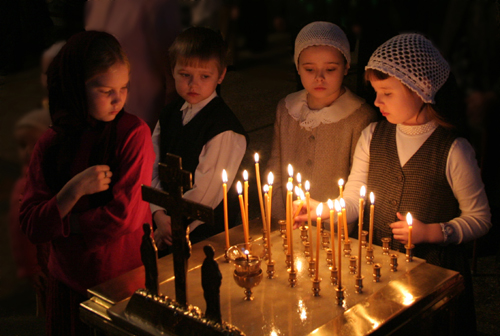It is teenagers that are less of all attend the temple. No matter how hard parents try to raise children in the faith, sometimes there comes a time when a maturing child refuses to go to the temple, confess, and receive Communion. Maybe this is the specifics of our time, which produced Orthodox families who themselves have no experience of church education?

Archpriest Pavel Velikanov
Or is it a natural age and spiritual crisis, which is not only inevitable, but even desirable? Is it so scary? And what can parents do to minimize the damage from their child’s breakup with the Church?
We are talking about this with Archpriest Pavel Velikanov, PhD in Theology, Rector of the Pyatnitsky Metochion of the Holy Trinity-St. Sergius Lavra in Sergiev Posad.
Is Faith Inherited?
– Father Pavel, can we see the specifics of the time in the fact that modern children in adolescence may leave the Church?
– I think we definitely can. I can assume that in our state and in our Church there has never been such an intensity of church life in relation to children that has been observed in Russia for the last 20-30 years. Nowhere in the written sources do we find evidence that children are massively brought to church every Sunday, that they take Holy Communion every Sunday, participate in various forms of out-of-service activities in the parish, such as Sunday schools, societies, classes, etc.
– It would seem that as a result of all this, the child should be firmly rooted in the Church!
– That’s it! But in practice, we see that one may not be much connected with the other. For some reason, the number of adolescents in the church is several times less than in other age categories.
I think one of the reasons is the following. We, parents, often want children to mechanically assimilate the personal religious experience that we ourselves have received as a result of certain life quests, mistakes, falls, gains on the way to the Church and which is infinitely dear to us. And our children find themselves within the church fence from infancy, they have no painful search for the meaning of life, because this meaning has already been transferred to them “by default”! We watch our children bowing in the church, confessing, taking Communion, praying, and we see in that a certain identity with what is happening to us. But they simply imitate us in what may not have been born yet in them, have not matured.
Therefore, the child should move away, distance a little from what he accepted “by default”. But what for? In order to return to the Christian seed that was laid in him, but already at a completely new level of understanding and experience. Just as a teenager cannot gain autonomy, independence and self-reliance if he does not break the “umbilical cord” connecting him with his parents on whom he is absolutely dependent, here is the same thing: the child needs to push off from something. Therefore, it seems to me that the separation from the Church of the certain part of the girls and the youngsters, starting from 12-15 years old, is quite explicable. And, I would not be afraid to say, sometimes it is even desirable: especially when the young man is “stuck” on his spiritual path, everything in his religious life is done “according to custom,” and not at all by his heart. And if this happens to someone, we should not panic.
– Do you mean leave as a rethinking of faith?
– I’m talking about the distance from the Church not as a decisive renunciation of life according to the Christian commandments, falling into various kinds of mortal sins and destructive way of life. No way! I say that the child should determine the measure and the form of his connection with the Church by himself.
And the main thing is that this connection should be maintained.
Besides, in adolescence, a child is very attracted to what is unknown to him, unexplored, and if he grew up in a church environment, it is the world that will have such special interest and attractiveness. Those who from childhood are immune to life in the world, to its joys and delights, are few. In most cases, the child does not have such immunity. Therefore, in my opinion, there is nothing terrible in the fact that the significance of the Church for him in this period will be lower than the significance of the youth environment, music, new friends, some entertainment, a pleasant pastime, a hobby, and so on. The main thing is that this significance is generally preserved.
Plumber from God
– Many parents try to protect a child from temptations, from childhood they do everything so that secular matterswere not interesting to him, caused disgust…
– The experience that I have accumulated in relation to the children of priests, my friends, allows me to say the following: a conscious attempt to protect a child from social life, from secular values, creating for him such a full-fledged greenhouse, in which he would mature, would become strong, sturdy, resistant to the raging waves of this sinful, passionate world, not only does not work, but often leads to the opposite results. Most often, the harder some “worldly” things were cut off, the more aspiration for these things, thirst – I would even say, some pathological thirst – the person then began to feel. And he could not satisfy it, although it would seem that it would have been possible to stop for a long time already: he was bursting out and carried away!
And vice versa. In those families of priests, where parents, first of all, with great responsibility, were engaged in the all-round development of their children: they tried to give them a good education, to develop musical, artistic, sports, and intellectual abilities; where the children did not feel defective in comparison with their classmates, and in some things even felt more advanced – because everything was done with the utmost responsibility before God! – teenagers in these families subsequently did not distance themselves from the Church, but opened it for themselves anew and then became priests and even monks and nuns. The period of youthful rebellion passed with minimal losses.
– Why is that? Does a high cultural level work as a vaccination?
– Yes, this is a kind of vaccination. For example, it is very difficult to satisfy a well-developed hearing of a child who has finished a music school with cheap pop music: for him this would be organically unacceptable, because it is just vulgar and shoddy. He is imbued with other values, he has a developed taste. And this approach, I think, can be transferred to the whole area of culture: what a child reads, what he listens to, what movies, performances, musicals he watches.
The main thing that parents should develop in a child is a taste for the truly, for the beautiful and some kind of internal immunity to the vulgar, unworthy, no matter how promoted and attractive it may seem.
Of course, it is important here to create the right cultural context of life, filled with genuine values and right meanings: the so popular “omnivorous” is absolutely unacceptable. Then these correct cultural values will become for him certain landmarks, such reference points as they are for the believer and for the secular person.
– In other words, the correct values are laid not only by purely Orthodox literature, Orthodox performances, Orthodox films?
– Absolutely. I would even say that the task is to instill real values in children not with the church cover, but, above all, particularly outside the Church, so that they could feel confident and always knew what they could lean on in the world.
Parents should create for a child the conditions most consonant with his spiritual constitution, psychological characteristics and should help him to develop these abilities as much as possible. And the wisdom lies in the fact that the vector of such a development should be finally turned to God. It is necessary to let the child understand that, in fact, any of his activities should be a prayer to God, and any activity inside or outside the church wall is a definite form of his spiritual ministry, his doing and his responsibility before God.
– Could you give an example?
– A plumber worked in my house at one time. He was not very religious actually. But he made me think seriously, and here’s why. First, he was extraordinarily responsible towards every little thing! Where another man would have done the work in one day and would have received his salary, this person carefully thought over what the consequences would be after a certain period of operation, which connector assembly would be better to put and so on. And secondly, he took for his work about one and a half times less than any non-professional plumber in our city. At the same time, he constantly visited various exhibitions, was aware of all the modern technical innovations, passed some advanced training courses. That is, the man lived entirely his work! And, you know, faced with such deep professional decency, I realized that he is, in fact, a deeply religious person. Because the motivation of his actions is not everyday, but ideal. From the point of view of worldly benefits, he would have to do all that easier, quicker, take more money and quickly hop to another object. But for him his work is a form of service to his neighbor.
And I think that children who treat their work this way — even if they chose the simplest profession — are happiness and blessings for their parents.

Bryan Thatcher
No Crisis – No Development
– You touched on a very interesting topic: how a person comes to God. It turns out that for parents faith is a choice, and for children is a tradition transmitted? No search, no choice, no suffering? But is it necessary to go through difficult searches and trials in order to gain faith?
– You know, I think, spiritual crises are absolutely inevitable in the life of any believer. Because where there is no crisis, there is no overcoming. Where there is no overcoming, there is no strengthening, development. I have never met such a deeply religious person in my life, who could sincerely say that he had never doubted anything, had never passed through a crisis of faith. Even if he grew up in a completely healthy, pious, full-fledged Christian family. Another thing is that these crises occur in completely different ways within the Church and outside the Church.
The crises of internal ecclesiastical life are much more severe and acute than when a person is in the space of obvious sin, unrighteousness and abnormality, and from there he looks out to the Church. It is easier to get out of the sinful world into the Church than to face a crisis of faith being a Christian.
And then either faith is minimized, reduced to certain external manifestations that ensure the normal existence of a person in this coordinate system. Either it substantially deepens and acquires a different quality, often leading to conflict with the real church life which a person lives.
– If faith is the result of your own choice, crisis, rethinking of life values, what role does the parents’ transfer to their children of their personal religious experience play?
– The fact is that, as one priest said, all children are naturally heathens. In the truest sense! What is paganism? It is the religion that is most comprehensible, convenient and executable from the point of view of a person in his present fallen, sinful state in which we are all. And in general, it is closer to the Old Testament paradigm of law and retribution.
For example, children are told: “We must pray, because if you do not pray, God will punish you”; “Do not sin, because God will punish you, do good deeds, fast, work, and see – the Lord will comfort you, make you happy.” Such a “legal” arrangement of certain contractual relations between a person and God is perfectly normal, understandable and enforceable for a child: you need to take Communion in order to make it good; Communion is right. And the child goes calmly, happily, performs everything that is needed, and really feels joy. Grace influences a child’s heart completely differently than it does with adults burdened with passions and sins…
This children’s religious experience, of course, is incomparable. In no case can it be replaced by the transmission of an adults’ religious experience to children. Adult perception is fundamentally different from children’s: the latter is primarily positive. For a child, the joy of being with God is normal and natural. And for an adult, this is almost aerobatics, because we have something to repent of, we have something to regret, we have something to ask forgiveness for from God. And the most terrible thing is when I see how parents begin to transmit this model of their religious experience to children. It is deeply wrong to make them repent of the sins they have no idea of, to make a world-wide drama from a small misdemeanor of a child. Well, the child lied, but who did not lie? Have you never lied in your life? And the child, who is being raised in this way, instantly learns to play role-playing games: to play the repentant sinner, confessor saturated with world grief; and as soon as he goes beyond the threshold of the temple, such “righteousness armor for parents” is quickly dropped and he becomes a usual ordinary child. And this is not the worst option; it is much more dangerous when a child becomes impregnated with artificial experiences that are inadequate to his age and consciousness, and therefore begins to feel “exceptional,” “not of this world,” arrogantly distances from his peers, to the delight of his newly-restored parents and to the detriment of his own mental health.
– Suppose the law can be passed on as a family tradition. And can a personal attitude to Christ be passed on?
– A child’s revelation of Christianity as the religion of Christ is a completely different matter. But in order for him to understand Christ as Savior and Redeemer, he should understand what he actually should be saved from and what exactly he needs to be redeemed from. And a child is simply not capable of realizing it up to a certain age! Therefore, I do not see a big danger in the fact that children for quite a long time live in the environment of mostly formal enforcement of superficial Christian prescriptions, in such an Old Testament paradigm where there is a clear law, punishment and reward, but with a clear perspective of development in the direction of Christian values.
– Isn’t it true that in adolescence, when a person explores the limits of his freedom, terrible and punishing God and the law in general will cause protest?
– I rather agree with you. But, if we are talking about small children, a different approach would mean blurring of the criteria. Competent, good, experienced psychologists recommend building the relationships with children so that they clearly understand where their freedom space is, where they are conditionally limited and where they are absolutely limited, where the “restricted area” is located. And if the child does not have this understanding, then in the end he will think that everything is allowed for him, unless the parents see.
Understanding that correct behavior is not an attempt to escape punishment and earn dividends in the Kingdom of Heaven, but simply the only normal pattern of behavior, the only possible manifestation of gratitude to Christ for what He did for us, should mature in a child at some point.
And I think that it is youthful crises that are the moments of the maturing of this understanding, kind of germination through this Old Testament paradigm of religious childishness – into something adult.
I read somewhere about such a case: on Good Friday, two girls from a Sunday school who went to the temple and were fully integrated into church life, suddenly stood up in front of the Cross, looked at Christ crucified on it, and one told another with sincere horror in her eyes: “Wait, did He get killed for us?” It suddenly dawned on these children that the Gospel was not some kind of myth, not some instructive story that had happened long ago and had nothing to do with you specifically, but it is associated with you personally. Everything that they had heard before about Christ, perhaps, worked as a certain foundation, but did not reach the soul.
Children actually have their own logic. And each child (and an adult too: it’s not about age) has a very different personal meeting with Christ. And the moment when the soil plowed by all parental efforts will sprout the personal relationship of the child and God, and in what form it will be – in the form of gratitude, in the form of overcoming some acute crisis, acute pain, grief – absolutely does not depend on us!
– Then what is required of us?
– We are required to not interfere, to prepare the conditions, bring up the child, on the one hand, in piety, but, on the other hand, in a healthy, open atmosphere. Everything else will be ruled by the Lord. We should not act here either as mediators or as translators – this is His business.
The Severity – Proportionally to Age
– Father Paul, how do your own children feel about the temple?
– My eldest daughter lives in another city, separately from us, and is just in this difficult adolescent period, but she does not lose contact with the Church: she goes to services, participates in sacraments. Of course, not with the frequency and intensity as I would have liked, but goes. She keeps the fast, again, to the extent that is now acceptable to her. I cannot say that I am absolutely calm about her, but I understand that she is now actively searching for herself. And I do not see those forms of search that would make me strongly oppose or protest.
The rest of the children are all very different. One of my sons can happily stand during the entire service in the temple, and without moving and with joy, without particularly being distracted and doing all that is needed – acting sacristan, for example. And the other son will stand for a bit, and then he will suffer, not knowing where to settle himself, what to do, will walk from one corner to another, talk to someone, and so on. Different personalities, different characters! But in general, the temple for them is a place they run with joy to. And skipping worship is something painful. Even when the child is sick, he may cry, be upset if you do not take him to the temple. I think, among other things, this is due to the fact that we have a very rich children’s program in the parish: an animation studio, calligraphy lessons, a Sunday school, and music lessons where they learn songs to sing in the children’s Liturgy (a service during which children help at the altar, read and sing on the choir. – Ed.), and the lessons of the so-called practical natural science, when they study the properties of different materials or make postcards with mechanical or electric “stuffing”.
– But they say that if children are connected with the temple only by a get-together, a set of hobbies, then by growing up, they will leave all this…
– There might be a certain truth in this. But in any case, I think what is more important is how children perceive the space of the temple. If it is a space of attention and love for you, and not the territory of law and punishment, it is not so important what exactly happens there. Children feel that there are some events organized for them not to send a report to the Patriarchate, but simply because they are loved.
– And how much do children need church discipline? The obligation of prayers, the obligation of going to the temple, fasting?
– Children definitely need discipline. Children have to live in a completely outlined, designated space, because it helps the child to structure life. Another question is a measure of the rigor of this discipline. I think it should be inversely proportional to the age of the child. The younger the child, the greater the degree of discipline should be. It is not about forcing a child, but there should just be such a mood in a family: when, let’s say, everyone goes to the temple, we have no other options. We do not even ask the question: well, are we going to the temple or not? When the child asks the question: why are we going to church on Sundays? – we can explain to him why.
– And if the child says: “May I not go to the temple this Sunday?”
– For example, you can say this: “Wait, where are you going? Will you be sleeping? Please sleep and we will go to the temple and come back happy and contented.” I think that the ideal situation is the one that Archpriest Vladimir Vorobyev described at one time: when, in Soviet times, members of religious families still needed to earn a trip to the temple! And here at our parish, I see that, by some miracle, such a model has been created for the participation of children in worship and the saturation of parish life, extra-liturgical activities, that children run to church. For them, it is a holiday, not a problem, a headache, or “lost private time.” I do not know what will happen when the kids grow up. We’ll see!
– There is such a point of view: when a child grows up and begins to separate himself from his parents, there should be a significant adult – godfather – who will be an authority for him. What would you say to this?
– You know, my personal opinion is this: I still have little faith in the institution of godparents. Because to become an authority for a child is a big problem. And to become an authority, so to speak, under duress, is a triple problem. Not even every parent is an authority for his child, and a stranger, an external person who does not live in a family, does not constantly communicate with children – how can he earn their trust? I can admit this in theory, but I think this is an exception rather than general practice. A real upbringing can only be when you are involved in the family life of your godchild: you can come into the family at least once a week and communicate with him, take him for a walk somewhere (not necessarily to the temple). And the role of a man who appeared in the house once in half a year is doubtful. Another thing is that in the changed circumstances, everything can turn 180 degrees. In adolescence, it is possible that the child will reach out to the godfather, will want to make friends with him, to get his support. I would not completely rule out the possibility of the participation of godparents in the life of their wards during such crisis periods. But I hope to God that at least in every tenth family there would be such a godfather who would be able to pick up the falling banner of parental authority and carry it. I’m not that, unfortunately.
Eternity Oxygen
– Did you have a crisis of faith in adolescence?
– I was just baptized at this age, at the age of 17: I should say, they baptized me without catechism, without any explanation, but simply because I was a very unhealthy child. But at the same time I had some kind of internal consent for baptism. And after a while I decided to come to the temple: since I am baptized, Orthodox, I need to know what I should do next? So my church life began.
But at that age I already had the experience of living outside the Church: I understood what would remain if the Church was removed from life. And children raised in the faith have no such understanding. And they often need to see the difference!
The most terrible impression that can remain in the soul of a child from visiting the temple is a tough, aggressive, hostile attitude on the part of the temple staff, the confessor and so on. And when a child in adolescence goes into the world and there finds real courage, involvement in an affair “with fiery eyes”, genuine sacrifice, love, real mutual assistance, which he did not know in the church environment (and these qualities can even be artificially highlighted, it can be perceived through the “rose-colored glasses” of youthful romanticism): this is the worst thing that can be! Because then he has a clear aversion to the Church, an idea that everything there is false. As Vladimir Vysotsky once sang: “No! And in the Church everything is not, everything is not as it should be! ” And it is unlikely that such a person will return…
And if a child “broke free”, he sees that everything in the world is cool, but cold and empty, and at the same time compares with his previous experience and understands that it is warmer in the Church, more humane in the Church, and people don’t talk like that, don’t do such meanness to each other, and you won’t see such rage, hatred, anger, then after meeting the world his head gradually turns back towards the Church, and he thinks: “Yes, it’s better to be close to the Church!”
The Church, as Metropolitan Filaret (Vakhromeev) once said, should be filled with “eternity oxygen,” but it should also be a space of tremendous heartfelt kindness and warmth. If there is no warmth in the Church, then I do not know what it is. It is anything but not the Church as the Living Body of Christ.
– It turns out, one way or another, but the call for parents, for church servants, for parishioners is still the same: to watch, first of all, for yourself?
– Yes, but who can say to himself: “I am a good parent, I always correspond to what I say”? We need to have the courage to explain to our children that we are also imperfect, we are also in a state of struggle, we are also on the way. The only parental quality that children should never doubt is parental love. The fact that mom and dad accept them, and regardless of how they feel about the Church. Child psychologists always say: first of all, the child should understand that his parents accept him as he is – and this is the most important thing! They may disagree with something in his life, argue. But the child should have no doubt that mom and dad love him no matter how good or bad his behavior is. Love does not set any requirements and conditions. And this is where its strength manifests itself.
Translated by Alyona Malafeeva

















